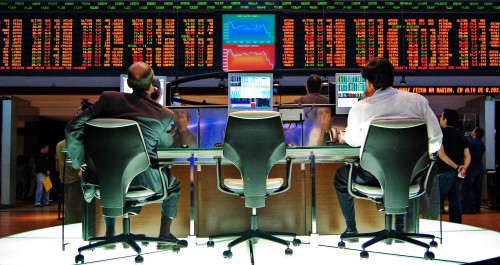 AFTER THE CHINESE MARKET’S RECENT SLUMP, INVESTORS BECAME increasingly worried about interest rates. The Federal Reserve is looking to make a decision in December.
AFTER THE CHINESE MARKET’S RECENT SLUMP, INVESTORS BECAME increasingly worried about interest rates. The Federal Reserve is looking to make a decision in December.Two hot topics lately in global markets have been interest rates and China. Over the past few months, interest rates have been teetering on whether or not to be increased, while China’s economy has been on a downward slope.
Since late 2008, the Federal Reserve System has kept close to a zero interest rate due to the housing market crash that caused the financial crisis, and nearly caused the United States to experience an economic downturn similar to the Great Depression. According to the Fed, a low interest rate is kept primarily used to promote stimulation in an economy by encouraging economic growth specifically through consumers borrowing money.
When they gathered in June of this year for their annual policy meeting, the Fed had many uncertainties about increasing rates. When they issued their meeting minutes, they wanted a more concrete indication of economic growth, along with other worldly issues before deciding to go ahead with an increase. Then, a few weeks ago on September 17, 2015, Janet Yellen, the chairman of the Fed, once again postponed an increase on interest rates.
William Dudley, president of the New York branch of the Federal Reserve, believes that the increase in rates could potentially be “disruptive” on a global scale. Investors have been nervous about rates rising, and now they’re watching China due to the global market chaos recently created by its slowing economy. China is still the world’s second largest economy and has been a key driver of global development. The Fed says that the U.S. economy is looking good, but what’s happening overseas created a pause regarding rates. China is wary and Europe’s rebound isn’t exactly emerging. This, in turn, might not be good news for U.S. companies doing business overseas.
Overall, yes, the U.S. economy has improved since the financial crisis in ’08 and raising interest rates is a sign that the Fed believes markets are healthy enough to launch the process of expansionary policy. Analysts have said that for the first rate hike, it is expected to only increase about 25 basis-points. Another topic on Wall Street is stimulus policies and their termination; some say that stimulative policy has intensified the financial crisis rather than solving it.
For now, the Fed is waiting until December to make a call on interest rates. The prolonged interest rate issues are largely due to worries involving world markets, and the takeaway is that even though investors were happy with low interest rates continuing a little longer, the global stance has offset the favorable news update.
